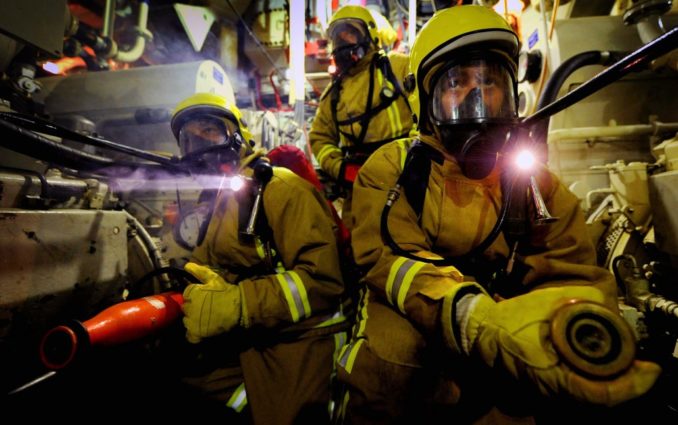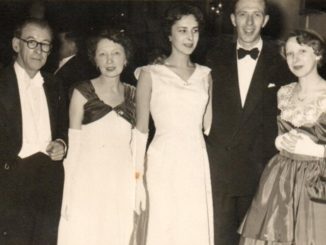
OGL (Open Government License)
When I left the Royal Fleet Auxiliary in 2015 I joined a shipping company operating out of Barrow-in-Furness. It was a very small outfit which specialised in carrying nuclear cargo between Europe, the US and Japan. I found it a refreshing change of pace from life in the RFA and was rather happy to leave behind many of the things which had led me to become very jaded and cynical about the RFA.
Most of my new shipmates had been with this outfit for many years. They had a rather high opinion of themselves, which to be fair wasn’t really surprising given the nature of the cargo they carried and the fact they had a pretty much perfect safety record with no serious incidents or mishaps. They were also very insular and wary of outsiders like me. Understand that those who sail under the Red Ensign don’t generally have much regard for those who sail under the White Ensign, and the RFA in particular are viewed with particular scorn. I’d encountered this going back to college to sit my higher level tickets and I could never quite understand where the hostility came from. As best I could gather it’s because the RFA are viewed by the Merchant Navy guys as being only one degree removed from the Royal Navy and for whatever reason they don’t like the Royal Navy.
Upon meeting new shipmates (or crews from the other ships) and being introduced, when asked where I’d come from as soon as I said “RFA” it was as if I had just told them I was a leper. I learned very quickly to see straight through the fake smiles.
What’s more I was a Second Engineer with my new employer – one of the so-called “Top Four” on board. I think my new shipmates expected me to come in with my awful RFA ways and try to run their ship like an RFA. I can remember I kept hearing the name of a new Chief Mate cropping up in conversation. He had recently joined the company from Maersk and wasn’t very popular because he had a zero tolerance attitude towards drinking on board. Maersk vessels are dry and this new guy had made it clear he didn’t approve of drinking on ship. Some of the most vicious criticism and backbiting came from the longer established senior officers who most definitely did drink on board, and heavily at that. I could see these guys were very afraid of people like me (and this new Chief Mate) coming in and upsetting their little outfit which had hitherto been very insular. I’d have to tread carefully.
As such I generally kept my mouth shut and tried to learn how things worked at my new employer. Luckily my first Chief Engineer was a very nice bloke whom I got on well with and I was honest and up front with him – “Chief, please understand I’ve only ever been to sea with the RFA, it’s all I’ve ever known and it’s my frame of reference for everything.” He was a decent enough bloke and understood this.
The culture was very different to what I was used to. I never got used to eating my meals in a mess room wearing a t-shirt and shorts. I could see my new shipmates were taken somewhat aback by my voice procedure when talking over the radio or when communicating between the Machinery Control Room and the Bridge (correct and proper voice procedure is heavily stressed in the RFA). I would go to find the Chief Engineer during mid-afternoon to ask him something and I’d find him sprawled out on the sofa in his cabin watching the telly, something I’d never find in a million years in the RFA.
Then came my first fire exercise. Now the modern RFA is only a degree or two removed from the Royal Navy in a great many respects. Firefighting and damage control is one of them. In the RFA we had the same emergency organisation as the RN, we did the same training, followed the same procedures, used the same equipment and were subjected to the same delights of FOST as our counterparts in the RN. As a cadet in the RFA I spent my fair share of time in a Fearnaught suit sucking air out of a BA set and I know how to tell a fire fighting nozzle from a water wall nozzle in the dark. As a junior engineering officer I was first 2 I/C of a Fire & Repair Party before working my way up be I/C. It was in this capacity I may possibly have once told Rear-Admiral Christopher Snow (Mr FOST himself) “Fuck off I’m busy!” during a Thursday War. To his credit he took it very gracefully and later remarked “The I/C seemed to know what he was doing!” Finally in my latter years in the service as a somewhat seasoned watch keeping engineer I ascended to the heady heights of Action Engineering Officer of the Watch 1 in the ship’s emergency/action organisation. As such it was my rather disconcerting job to keep the lights on and propeller turning as the Exocets hit the ship. Suffice to say I didn’t much fancy my chances of survival should I ever have had to do it for real.
Anyway, back in lovely Barrow….. The scenario for the exercise was a fire in the paint locker which was in the focsle. As the Second Engineer I formed one half of the ERT (Emergency Response Team – very similar to the SSEP for all you old Pusser types). The other half of the ERT was the Chief Mate.
When the exercise was initiated I was in the changing room just outside the engine room putting my boots on. The pipe was made to investigate a smoke alarm activated in the paint locker. I called the Bridge up on the radio and told them I was going up forward to the focsle to investigate. Once there I simply shut the paint locker door, shut down the ventilation for the compartment and did a touch drill for operating the fixed firefighting system (sprinklers) inside. I then went outside, called up the Bridge on the radio to tell them what I’d done, informed them I was about to start rigging a hose and asked for them to confirm the fire main pressure.
I got a very unsure response from the Bridge. A few minutes later the Chief Mate appeared looking very displeased with me telling me I should have gone to the Bridge. We went about rigging a hose for firefighting and another for boundary cooling. A while later the Fourth Engineer appeared in firefighting gear. I noted the straps on his BA set were all loose and flapping about, his gloves weren’t on his hands properly, his mask was not on his face properly (meaning he almost certainly hadn’t done a face seal check) and his flash hood wasn’t covering all of the exposed skin.
Afterwards at the wash up I was asked what I thought I was doing? I told them I was taking the initial actions to contain and suppress the fire.
Nope. They told me instead of going forward to investigate and do the things I did, I should have instead gone up four decks to the Bridge and met with the Chief Mate before going to the focsle.
You wot?
In the time it would have taken me to do that what would have been a little smouldering camp fire in the paint locker could have turned into a raging inferno. Surely the Emergency Response Team should, you know…. Respond to the bloody emergency?
Nope. “That’s not how we do it here!” I was told.
I also raised the observation that the Fourth Engineer was inadequately dressed to fight a fire and suggested that he might be given the opportunity to be re-briefed on how one should properly dress to fight a fire. Nope. Not necessary. I later asked the Fourth Engineer who helped him get dressed. “Nobody” it appears is detailed to help the firefighters get dressed, they have to do it all by themselves. In the RFA and RN there are “dressers” who assist the firefighters in getting all their gear on properly and check everything before they go off to the scene and fight the fire.
I was really taken aback at all of this. I knew that firefighting and such like isn’t trained for and prepared for to the same degree as in the RFA, but I had no idea it was this bad. What I did was exactly what would have been expected of me in the RFA, and what would FOST would have expected me to do during a proper FOST serial. Yet apparently I was the stupid Second from the RFA who made a complete arse of a fire exercise.
It was at this point that I realised these guys were nowhere near as good as they thought they were and that the difference in culture from where I had come from was a yawning chasm.
My new shipmates who looked rather disdainfully down their noses at the RFA had no business doing so. For all the things wrong with the RFA (and there are a lot of them) when it comes to the business of professional seafaring, the RFA is very, *very* good and does not deserve the scorn of Merchant Navy seafarers.
I was only with this new outfit for eight months. I went for my ENG1 seafarer’s medical and passed blood in my urine which lead me to being given a “harbour duties only” restriction. I got sent home to find out what the problem was and shortly after the company terminated my contract as I was unable to go to sea. A recent audit had criticised how many employees were on either long term sick leave or had restricted ENG1 certificates, I suspect they thought I’d be joining those on the long term sick so they sacked me before I could get signed off work. The funny thing was it took a couple of weeks for my GP to confirm there was nothing wrong with me – the blood in my urine (or microscopic haematuria) was caused by the physical effort of carrying all my bags and gear up a steep gangway then up another five decks to my cabin about twelve hours before I went for the medical. I got my full, unrestricted ENG1 medical on the same day I received a letter from the company saying they were terminating my employment.
When I was sent home one of the Chief Mates warned me I could be sacked. He had recently been given the all clear after cancer and was having trouble convincing his doctor to issue him with an ENG1. He was only able to work on a ship in port and said if he couldn’t get a full ENG1 certificate in the next few months he was expecting to be sacked. Likewise a Chief Engineer who had been working in the office for the last couple of years whilst he was being treated for alcoholism was told if he couldn’t get a full, unrestricted ENG1 within six weeks he’d be sacked. His reaction was to disappear on a five day bender… after going missing like that his security clearance was revoked and he was sacked as a result.
And that, ladies and gentlemen, is how despite being someone who has a rather intense dislike of heights, I found myself 663ft above the City of London in a shirt and tie trying to work out why the red obstruction lights on a skyscraper weren’t working….
© Æthelberht 2018
Audio file
Audio Player



